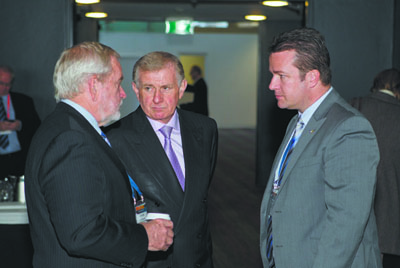The 2012 Australian Local Government Association (ALGA) General Assembly, held over three days in Canberra in June, was characterised by a sense of high drama for a number of reasons.
First, Councillor Genia McCaffery, ALGA President and Mayor of North Sydney, had recently announced her resignation from local government, closing the curtains on a long and distinguished career.
The Hon. Simon Crean, Minister for Regional Australia, Local Government, Arts and Sport, who has worked closely with Councillor McCaffery during her term as ALGA President, acknowledged her contribution to local government, saying “Genia is a passionate leader of and contributor to her local community. Her record is impressive – four terms as Mayor, three as President of the NSW Local Government Association and the current term as President of ALGA.
“She will leave with a proud record of achievement in each of those organisations and most importantly for her local North Sydney community. She is – and I am sure she will continue to be – a great advocate for local government.”
Constitutional recognition
While the issue of constitutional recognition of local government was already high on the Assembly’s agenda, the High Court’s uncanny timing of the decision in the Williams case stole the show.
Handed down on the final day of the conference, the import of the Williams decision had been anticipated by all those addressing constitutional recognition; so much so that the report commissioned by the ALGA recommended ‘financial recognition’ as the key to a successful referendum.
The push for constitutional recognition, as a way to ensure the ability of the Federal Government to fund programs managed by councils, such as the Roads to Recovery program, was unanimously supported by the 850 delegates. The next step, as nearly every speaker made patently clear, is an organised, media savvy and concerted campaign that guarantees a ‘yes’ vote in a referendum.
Councils have absolutely no excuse for letting this one go through to the keeper, particularly in light of the added incentive of the Williams decision, which has put direct federal funding of programs that operate on a local level firmly in the spotlight.
Infrastructure, planning, services
The three themes of the Assembly were hotly debated and discussed, and a significant number of related resolutions were passed by the end of the three days.
Regional Australia was a particular focus, following the launch of the annual ‘State of the Regions’ report during the Regional Cooperation and Development Forum, held on the weekend prior to the Assembly.
Again, the issue of constitutional recognition dominated, as central to any discussion about infrastructure, planning and services is how to finance the vast array of works undertaken or overseen by local government.
While financial recognition doesn’t magically open up the coffers, at the very least it will make it easier for the Federal Government to allocate funds to the level of government that is closest to the community.
Climate change
The impact of the carbon tax on councils and their ratepayers was like the elephant in the room throughout the Assembly. Although somewhat reassured by an extremely detailed analysis by the Parliamentary Secretary for Climate Change & Energy Efficiency, the Hon. Mark Dreyfus QC MP, there remains a relatively high degree of nervousness amongst councils and their communities about the impact of the tax.
What became clear, however, is that councils that have been proactive in making changes regarding energy efficiency are unlikely to be negatively impacted and in fact, stand to profit from the price on carbon. And, as evidenced by the feature on Environmental Management in the June issue of Local Government Focus, very few councils across Australia have dropped the ball in relation to energy efficiency.
Inspiring & entertaining
The ALGA needs to be congratulated on the high level of presentations, discussion and debate at the Assembly; it was entertaining, enlightening and, in many ways, inspiring. It is clear that it is time to take advantage of a very real shift in the community’s perception of the role of councils and take the leap of faith into constitutional change.








